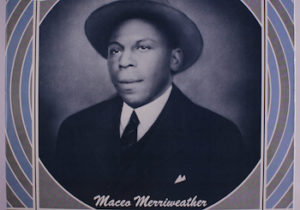
Big Maceo
*On this date, we recall the birth of Big Maceo in 1905. He was a Black blues singer and musician.
Born Major Merewether in Atlanta, GA., he taught himself how to play the piano. When he was about twenty, Maceo moved with his family to Detroit. Shortly after his arrival, he began playing house-rent parties and clubs. In 1941, a desire to record led Maceo to settle in Chicago. There, he met the popular blues guitarist Tampa Red. They soon became best friends and performing partners. Red introduced Big Maceo to producer Lester Melrose of Bluebird Records, who signed him to a recording contract.
Big Maceo's first record was Worried Life Blues (1941), which became a blues hit and made him a star in Chicago blues circles. It was his biggest hit and has become a standard in the blues piano, remaining Maceo's trademark tune. Other classics such as Chicago Breakdown, Texas Stomp, and Detroit Jump followed. Maceo's piano style developed from players like Leroy Carr, Roosevelt Sykes, and Josh Altheimer, as well as from the rolling, boogie-woogie sounds of Meade "Lux" Lewis and Albert Ammons. Big Maceo cut some thirty recordings, most of them exceptional, before his career was cut short in 1946 by a stroke. Big Maceo was one of the most influential blues and Boogie-Woogie piano players of the 1940s.
His heavy-handed style impacted practically every post-World War II blues pianist of note, especially Otis Spann, Johnny Jones, and Eddie Boyd. With a hazy voice and a fine piano style built on heavy bass notes, Maceo often recorded some classic Chicago piano numbers in the 1940s with Tampa Red on guitar. Big Maceo died on February 23, 1953.
Nothing But the Blues The Music and the Musicians
Edited by Lawrence Cohn
Copyright 1993 Abbeville Publishing Group, New York
ISBN 1-55859-271-7